Innovative and Creative Thinking
VerifiedAdded on 2023/06/03
|11
|2791
|193
AI Summary
This paper evaluates the innovation competencies of creative thinking and ideation traits and adaptability and leadership traits. It explores the future-focused approach and passion and purpose approach. The paper discusses the importance of curiosity, authenticity, passion, purpose, and ethical commitments in the business world.
Contribute Materials
Your contribution can guide someone’s learning journey. Share your
documents today.
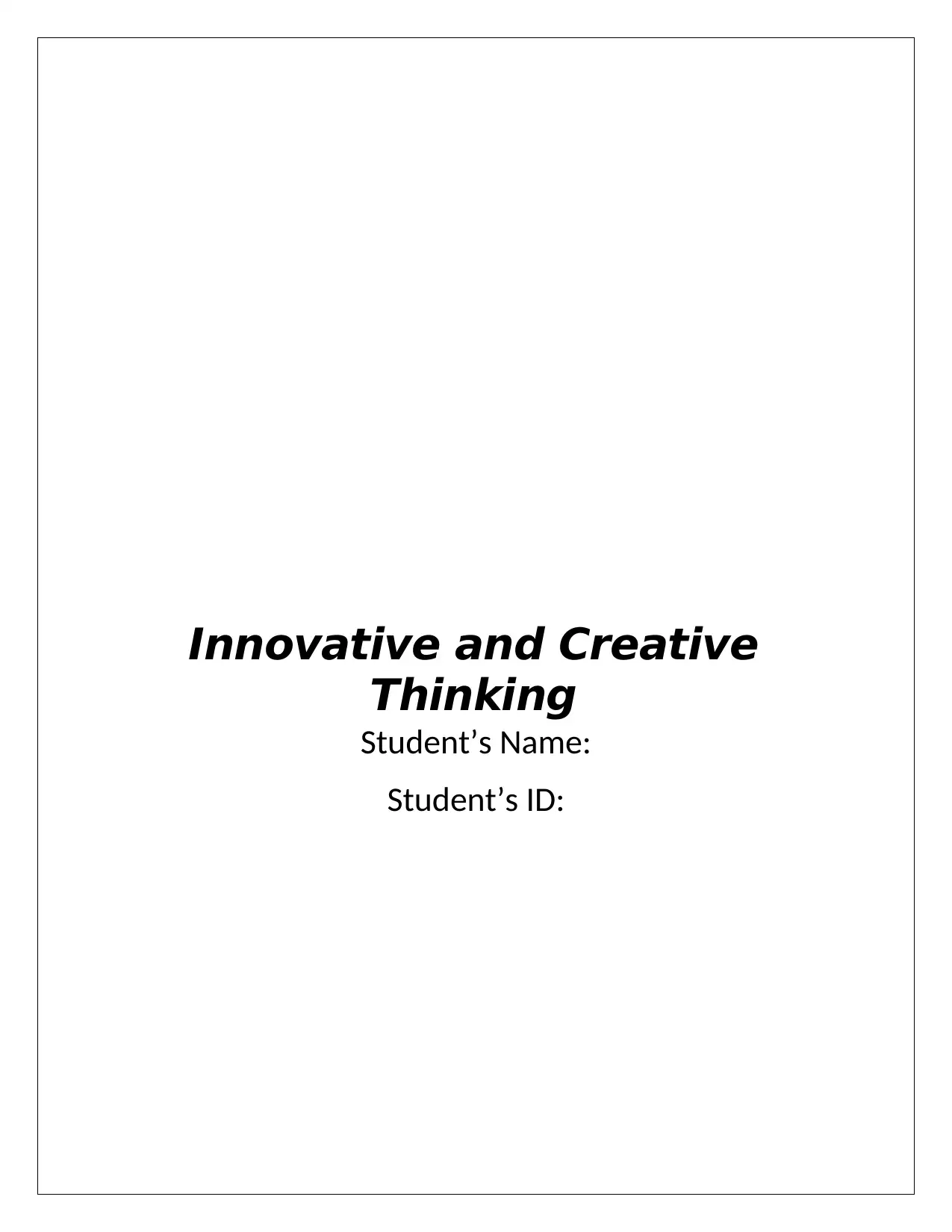
Innovative and Creative
Thinking
Student’s Name:
Student’s ID:
Thinking
Student’s Name:
Student’s ID:
Secure Best Marks with AI Grader
Need help grading? Try our AI Grader for instant feedback on your assignments.
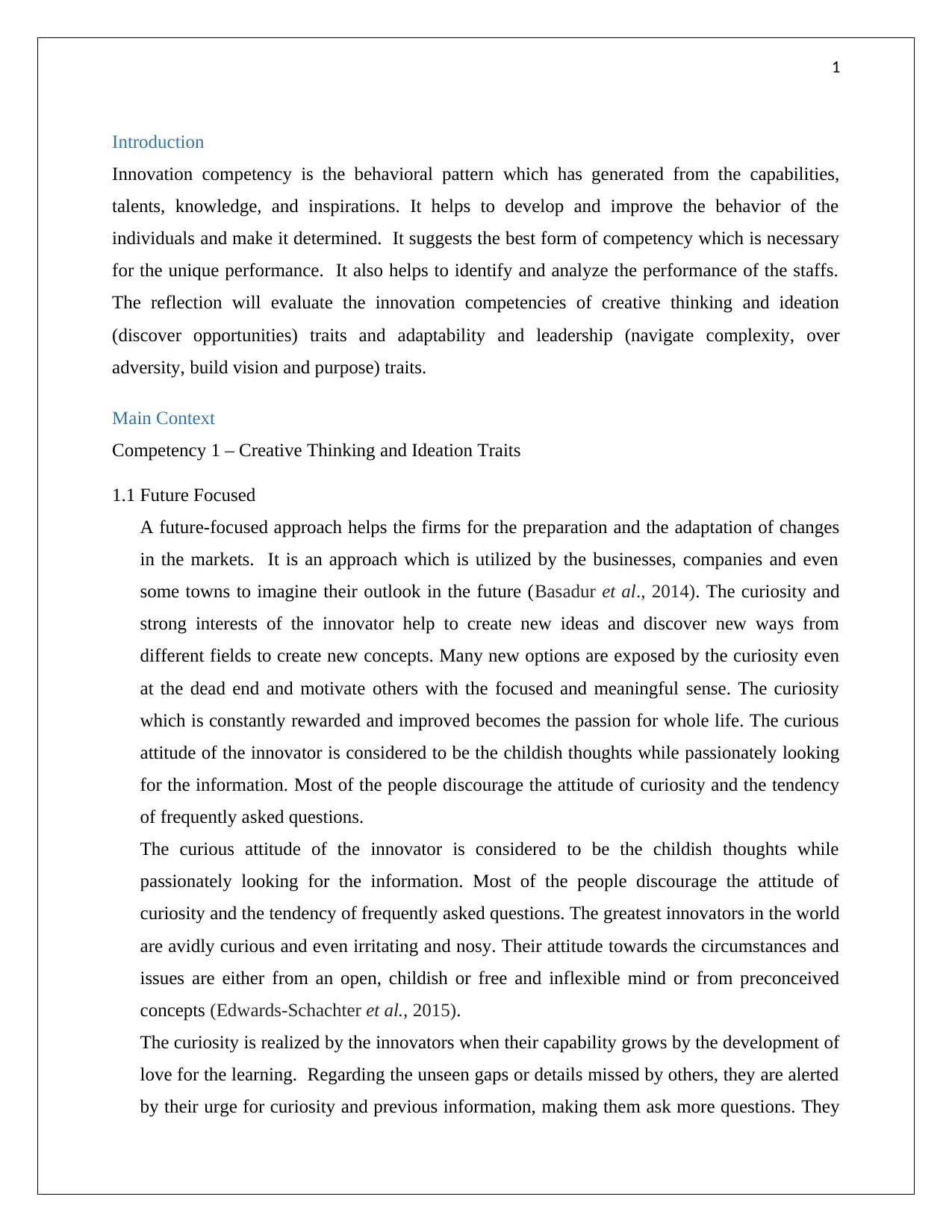
1
Introduction
Innovation competency is the behavioral pattern which has generated from the capabilities,
talents, knowledge, and inspirations. It helps to develop and improve the behavior of the
individuals and make it determined. It suggests the best form of competency which is necessary
for the unique performance. It also helps to identify and analyze the performance of the staffs.
The reflection will evaluate the innovation competencies of creative thinking and ideation
(discover opportunities) traits and adaptability and leadership (navigate complexity, over
adversity, build vision and purpose) traits.
Main Context
Competency 1 – Creative Thinking and Ideation Traits
1.1 Future Focused
A future-focused approach helps the firms for the preparation and the adaptation of changes
in the markets. It is an approach which is utilized by the businesses, companies and even
some towns to imagine their outlook in the future (Basadur et al., 2014). The curiosity and
strong interests of the innovator help to create new ideas and discover new ways from
different fields to create new concepts. Many new options are exposed by the curiosity even
at the dead end and motivate others with the focused and meaningful sense. The curiosity
which is constantly rewarded and improved becomes the passion for whole life. The curious
attitude of the innovator is considered to be the childish thoughts while passionately looking
for the information. Most of the people discourage the attitude of curiosity and the tendency
of frequently asked questions.
The curious attitude of the innovator is considered to be the childish thoughts while
passionately looking for the information. Most of the people discourage the attitude of
curiosity and the tendency of frequently asked questions. The greatest innovators in the world
are avidly curious and even irritating and nosy. Their attitude towards the circumstances and
issues are either from an open, childish or free and inflexible mind or from preconceived
concepts (Edwards-Schachter et al., 2015).
The curiosity is realized by the innovators when their capability grows by the development of
love for the learning. Regarding the unseen gaps or details missed by others, they are alerted
by their urge for curiosity and previous information, making them ask more questions. They
Introduction
Innovation competency is the behavioral pattern which has generated from the capabilities,
talents, knowledge, and inspirations. It helps to develop and improve the behavior of the
individuals and make it determined. It suggests the best form of competency which is necessary
for the unique performance. It also helps to identify and analyze the performance of the staffs.
The reflection will evaluate the innovation competencies of creative thinking and ideation
(discover opportunities) traits and adaptability and leadership (navigate complexity, over
adversity, build vision and purpose) traits.
Main Context
Competency 1 – Creative Thinking and Ideation Traits
1.1 Future Focused
A future-focused approach helps the firms for the preparation and the adaptation of changes
in the markets. It is an approach which is utilized by the businesses, companies and even
some towns to imagine their outlook in the future (Basadur et al., 2014). The curiosity and
strong interests of the innovator help to create new ideas and discover new ways from
different fields to create new concepts. Many new options are exposed by the curiosity even
at the dead end and motivate others with the focused and meaningful sense. The curiosity
which is constantly rewarded and improved becomes the passion for whole life. The curious
attitude of the innovator is considered to be the childish thoughts while passionately looking
for the information. Most of the people discourage the attitude of curiosity and the tendency
of frequently asked questions.
The curious attitude of the innovator is considered to be the childish thoughts while
passionately looking for the information. Most of the people discourage the attitude of
curiosity and the tendency of frequently asked questions. The greatest innovators in the world
are avidly curious and even irritating and nosy. Their attitude towards the circumstances and
issues are either from an open, childish or free and inflexible mind or from preconceived
concepts (Edwards-Schachter et al., 2015).
The curiosity is realized by the innovators when their capability grows by the development of
love for the learning. Regarding the unseen gaps or details missed by others, they are alerted
by their urge for curiosity and previous information, making them ask more questions. They
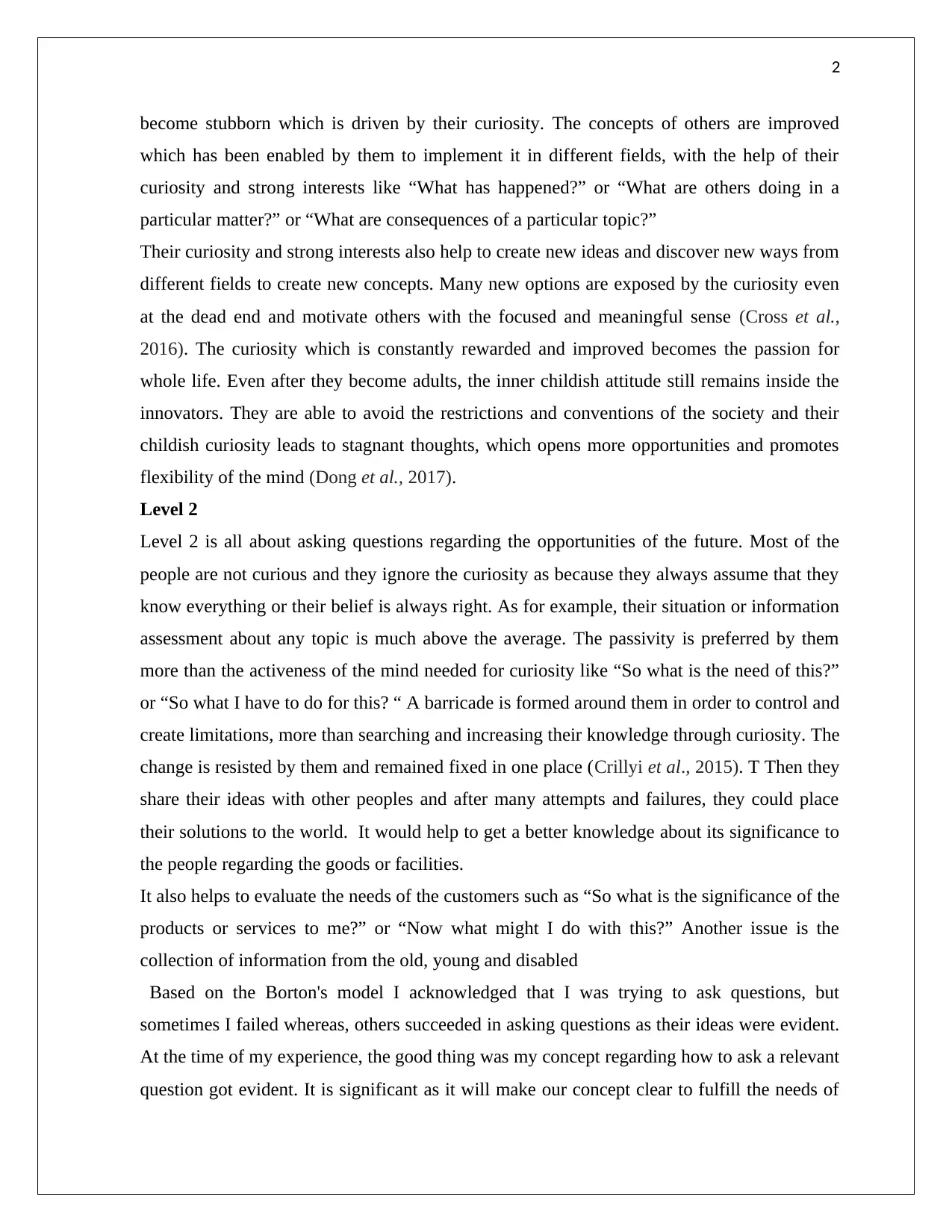
2
become stubborn which is driven by their curiosity. The concepts of others are improved
which has been enabled by them to implement it in different fields, with the help of their
curiosity and strong interests like “What has happened?” or “What are others doing in a
particular matter?” or “What are consequences of a particular topic?”
Their curiosity and strong interests also help to create new ideas and discover new ways from
different fields to create new concepts. Many new options are exposed by the curiosity even
at the dead end and motivate others with the focused and meaningful sense (Cross et al.,
2016). The curiosity which is constantly rewarded and improved becomes the passion for
whole life. Even after they become adults, the inner childish attitude still remains inside the
innovators. They are able to avoid the restrictions and conventions of the society and their
childish curiosity leads to stagnant thoughts, which opens more opportunities and promotes
flexibility of the mind (Dong et al., 2017).
Level 2
Level 2 is all about asking questions regarding the opportunities of the future. Most of the
people are not curious and they ignore the curiosity as because they always assume that they
know everything or their belief is always right. As for example, their situation or information
assessment about any topic is much above the average. The passivity is preferred by them
more than the activeness of the mind needed for curiosity like “So what is the need of this?”
or “So what I have to do for this? “ A barricade is formed around them in order to control and
create limitations, more than searching and increasing their knowledge through curiosity. The
change is resisted by them and remained fixed in one place (Crillyi et al., 2015). T Then they
share their ideas with other peoples and after many attempts and failures, they could place
their solutions to the world. It would help to get a better knowledge about its significance to
the people regarding the goods or facilities.
It also helps to evaluate the needs of the customers such as “So what is the significance of the
products or services to me?” or “Now what might I do with this?” Another issue is the
collection of information from the old, young and disabled
Based on the Borton's model I acknowledged that I was trying to ask questions, but
sometimes I failed whereas, others succeeded in asking questions as their ideas were evident.
At the time of my experience, the good thing was my concept regarding how to ask a relevant
question got evident. It is significant as it will make our concept clear to fulfill the needs of
become stubborn which is driven by their curiosity. The concepts of others are improved
which has been enabled by them to implement it in different fields, with the help of their
curiosity and strong interests like “What has happened?” or “What are others doing in a
particular matter?” or “What are consequences of a particular topic?”
Their curiosity and strong interests also help to create new ideas and discover new ways from
different fields to create new concepts. Many new options are exposed by the curiosity even
at the dead end and motivate others with the focused and meaningful sense (Cross et al.,
2016). The curiosity which is constantly rewarded and improved becomes the passion for
whole life. Even after they become adults, the inner childish attitude still remains inside the
innovators. They are able to avoid the restrictions and conventions of the society and their
childish curiosity leads to stagnant thoughts, which opens more opportunities and promotes
flexibility of the mind (Dong et al., 2017).
Level 2
Level 2 is all about asking questions regarding the opportunities of the future. Most of the
people are not curious and they ignore the curiosity as because they always assume that they
know everything or their belief is always right. As for example, their situation or information
assessment about any topic is much above the average. The passivity is preferred by them
more than the activeness of the mind needed for curiosity like “So what is the need of this?”
or “So what I have to do for this? “ A barricade is formed around them in order to control and
create limitations, more than searching and increasing their knowledge through curiosity. The
change is resisted by them and remained fixed in one place (Crillyi et al., 2015). T Then they
share their ideas with other peoples and after many attempts and failures, they could place
their solutions to the world. It would help to get a better knowledge about its significance to
the people regarding the goods or facilities.
It also helps to evaluate the needs of the customers such as “So what is the significance of the
products or services to me?” or “Now what might I do with this?” Another issue is the
collection of information from the old, young and disabled
Based on the Borton's model I acknowledged that I was trying to ask questions, but
sometimes I failed whereas, others succeeded in asking questions as their ideas were evident.
At the time of my experience, the good thing was my concept regarding how to ask a relevant
question got evident. It is significant as it will make our concept clear to fulfill the needs of
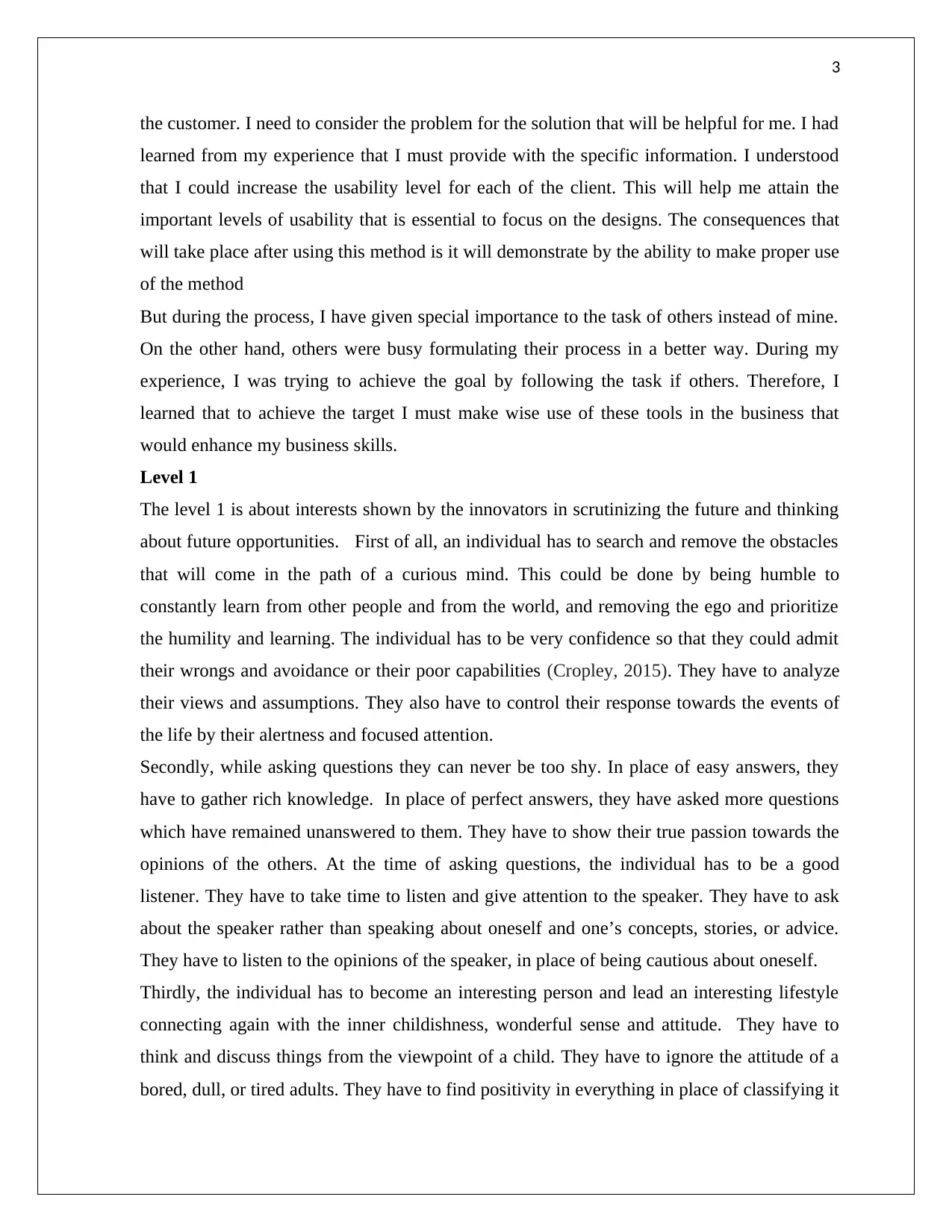
3
the customer. I need to consider the problem for the solution that will be helpful for me. I had
learned from my experience that I must provide with the specific information. I understood
that I could increase the usability level for each of the client. This will help me attain the
important levels of usability that is essential to focus on the designs. The consequences that
will take place after using this method is it will demonstrate by the ability to make proper use
of the method
But during the process, I have given special importance to the task of others instead of mine.
On the other hand, others were busy formulating their process in a better way. During my
experience, I was trying to achieve the goal by following the task if others. Therefore, I
learned that to achieve the target I must make wise use of these tools in the business that
would enhance my business skills.
Level 1
The level 1 is about interests shown by the innovators in scrutinizing the future and thinking
about future opportunities. First of all, an individual has to search and remove the obstacles
that will come in the path of a curious mind. This could be done by being humble to
constantly learn from other people and from the world, and removing the ego and prioritize
the humility and learning. The individual has to be very confidence so that they could admit
their wrongs and avoidance or their poor capabilities (Cropley, 2015). They have to analyze
their views and assumptions. They also have to control their response towards the events of
the life by their alertness and focused attention.
Secondly, while asking questions they can never be too shy. In place of easy answers, they
have to gather rich knowledge. In place of perfect answers, they have asked more questions
which have remained unanswered to them. They have to show their true passion towards the
opinions of the others. At the time of asking questions, the individual has to be a good
listener. They have to take time to listen and give attention to the speaker. They have to ask
about the speaker rather than speaking about oneself and one’s concepts, stories, or advice.
They have to listen to the opinions of the speaker, in place of being cautious about oneself.
Thirdly, the individual has to become an interesting person and lead an interesting lifestyle
connecting again with the inner childishness, wonderful sense and attitude. They have to
think and discuss things from the viewpoint of a child. They have to ignore the attitude of a
bored, dull, or tired adults. They have to find positivity in everything in place of classifying it
the customer. I need to consider the problem for the solution that will be helpful for me. I had
learned from my experience that I must provide with the specific information. I understood
that I could increase the usability level for each of the client. This will help me attain the
important levels of usability that is essential to focus on the designs. The consequences that
will take place after using this method is it will demonstrate by the ability to make proper use
of the method
But during the process, I have given special importance to the task of others instead of mine.
On the other hand, others were busy formulating their process in a better way. During my
experience, I was trying to achieve the goal by following the task if others. Therefore, I
learned that to achieve the target I must make wise use of these tools in the business that
would enhance my business skills.
Level 1
The level 1 is about interests shown by the innovators in scrutinizing the future and thinking
about future opportunities. First of all, an individual has to search and remove the obstacles
that will come in the path of a curious mind. This could be done by being humble to
constantly learn from other people and from the world, and removing the ego and prioritize
the humility and learning. The individual has to be very confidence so that they could admit
their wrongs and avoidance or their poor capabilities (Cropley, 2015). They have to analyze
their views and assumptions. They also have to control their response towards the events of
the life by their alertness and focused attention.
Secondly, while asking questions they can never be too shy. In place of easy answers, they
have to gather rich knowledge. In place of perfect answers, they have asked more questions
which have remained unanswered to them. They have to show their true passion towards the
opinions of the others. At the time of asking questions, the individual has to be a good
listener. They have to take time to listen and give attention to the speaker. They have to ask
about the speaker rather than speaking about oneself and one’s concepts, stories, or advice.
They have to listen to the opinions of the speaker, in place of being cautious about oneself.
Thirdly, the individual has to become an interesting person and lead an interesting lifestyle
connecting again with the inner childishness, wonderful sense and attitude. They have to
think and discuss things from the viewpoint of a child. They have to ignore the attitude of a
bored, dull, or tired adults. They have to find positivity in everything in place of classifying it
Secure Best Marks with AI Grader
Need help grading? Try our AI Grader for instant feedback on your assignments.
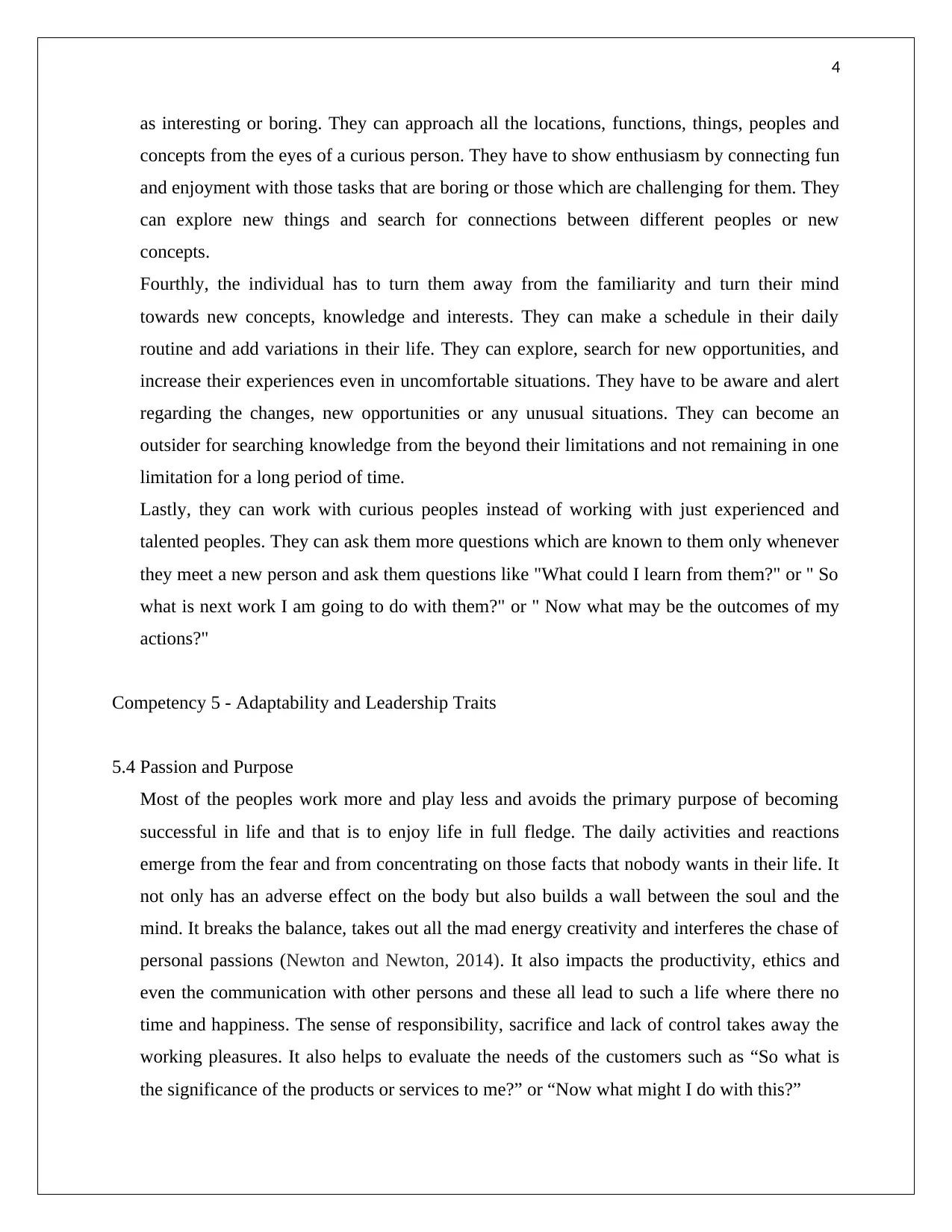
4
as interesting or boring. They can approach all the locations, functions, things, peoples and
concepts from the eyes of a curious person. They have to show enthusiasm by connecting fun
and enjoyment with those tasks that are boring or those which are challenging for them. They
can explore new things and search for connections between different peoples or new
concepts.
Fourthly, the individual has to turn them away from the familiarity and turn their mind
towards new concepts, knowledge and interests. They can make a schedule in their daily
routine and add variations in their life. They can explore, search for new opportunities, and
increase their experiences even in uncomfortable situations. They have to be aware and alert
regarding the changes, new opportunities or any unusual situations. They can become an
outsider for searching knowledge from the beyond their limitations and not remaining in one
limitation for a long period of time.
Lastly, they can work with curious peoples instead of working with just experienced and
talented peoples. They can ask them more questions which are known to them only whenever
they meet a new person and ask them questions like "What could I learn from them?" or " So
what is next work I am going to do with them?" or " Now what may be the outcomes of my
actions?"
Competency 5 - Adaptability and Leadership Traits
5.4 Passion and Purpose
Most of the peoples work more and play less and avoids the primary purpose of becoming
successful in life and that is to enjoy life in full fledge. The daily activities and reactions
emerge from the fear and from concentrating on those facts that nobody wants in their life. It
not only has an adverse effect on the body but also builds a wall between the soul and the
mind. It breaks the balance, takes out all the mad energy creativity and interferes the chase of
personal passions (Newton and Newton, 2014). It also impacts the productivity, ethics and
even the communication with other persons and these all lead to such a life where there no
time and happiness. The sense of responsibility, sacrifice and lack of control takes away the
working pleasures. It also helps to evaluate the needs of the customers such as “So what is
the significance of the products or services to me?” or “Now what might I do with this?”
as interesting or boring. They can approach all the locations, functions, things, peoples and
concepts from the eyes of a curious person. They have to show enthusiasm by connecting fun
and enjoyment with those tasks that are boring or those which are challenging for them. They
can explore new things and search for connections between different peoples or new
concepts.
Fourthly, the individual has to turn them away from the familiarity and turn their mind
towards new concepts, knowledge and interests. They can make a schedule in their daily
routine and add variations in their life. They can explore, search for new opportunities, and
increase their experiences even in uncomfortable situations. They have to be aware and alert
regarding the changes, new opportunities or any unusual situations. They can become an
outsider for searching knowledge from the beyond their limitations and not remaining in one
limitation for a long period of time.
Lastly, they can work with curious peoples instead of working with just experienced and
talented peoples. They can ask them more questions which are known to them only whenever
they meet a new person and ask them questions like "What could I learn from them?" or " So
what is next work I am going to do with them?" or " Now what may be the outcomes of my
actions?"
Competency 5 - Adaptability and Leadership Traits
5.4 Passion and Purpose
Most of the peoples work more and play less and avoids the primary purpose of becoming
successful in life and that is to enjoy life in full fledge. The daily activities and reactions
emerge from the fear and from concentrating on those facts that nobody wants in their life. It
not only has an adverse effect on the body but also builds a wall between the soul and the
mind. It breaks the balance, takes out all the mad energy creativity and interferes the chase of
personal passions (Newton and Newton, 2014). It also impacts the productivity, ethics and
even the communication with other persons and these all lead to such a life where there no
time and happiness. The sense of responsibility, sacrifice and lack of control takes away the
working pleasures. It also helps to evaluate the needs of the customers such as “So what is
the significance of the products or services to me?” or “Now what might I do with this?”

5
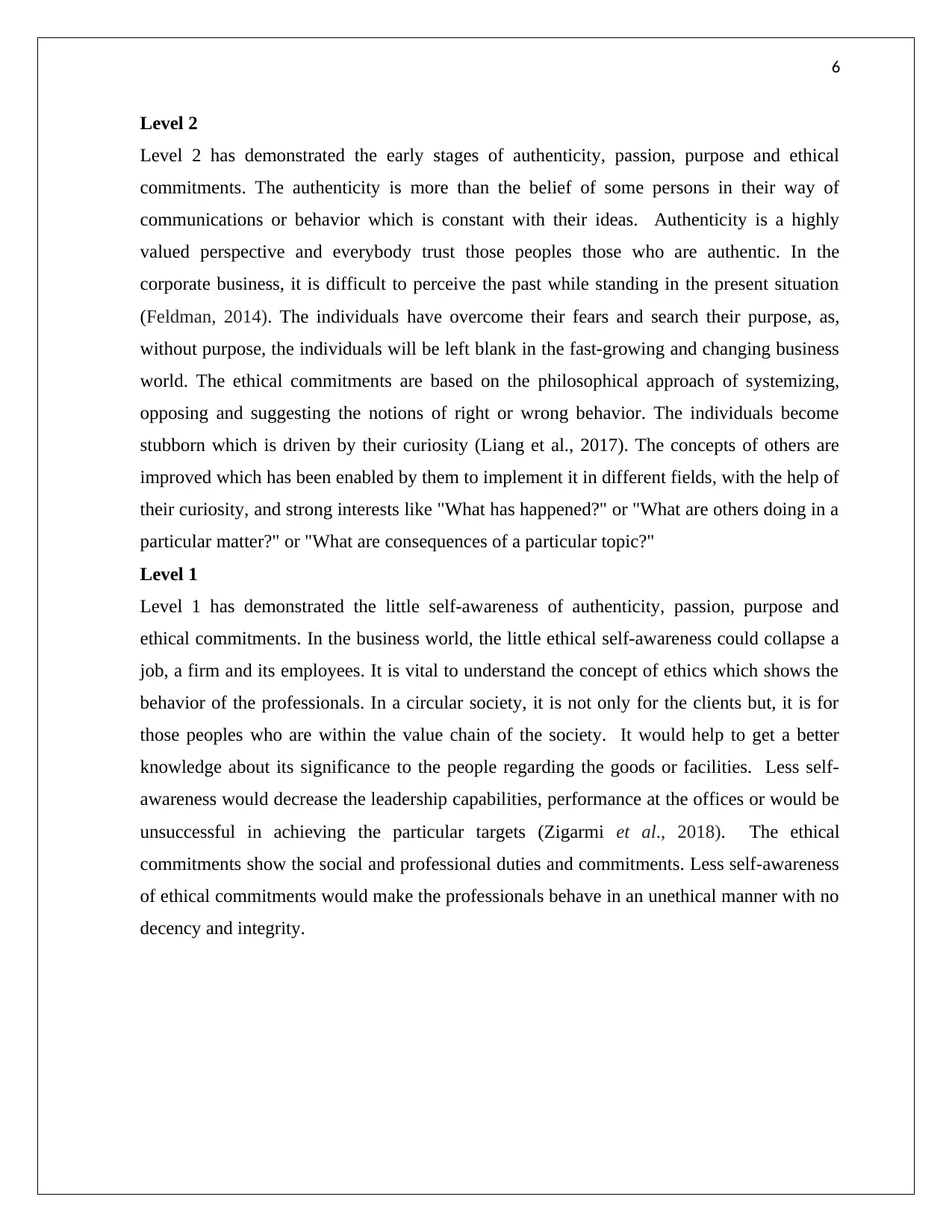
6
Level 2
Level 2 has demonstrated the early stages of authenticity, passion, purpose and ethical
commitments. The authenticity is more than the belief of some persons in their way of
communications or behavior which is constant with their ideas. Authenticity is a highly
valued perspective and everybody trust those peoples those who are authentic. In the
corporate business, it is difficult to perceive the past while standing in the present situation
(Feldman, 2014). The individuals have overcome their fears and search their purpose, as,
without purpose, the individuals will be left blank in the fast-growing and changing business
world. The ethical commitments are based on the philosophical approach of systemizing,
opposing and suggesting the notions of right or wrong behavior. The individuals become
stubborn which is driven by their curiosity (Liang et al., 2017). The concepts of others are
improved which has been enabled by them to implement it in different fields, with the help of
their curiosity, and strong interests like "What has happened?" or "What are others doing in a
particular matter?" or "What are consequences of a particular topic?"
Level 1
Level 1 has demonstrated the little self-awareness of authenticity, passion, purpose and
ethical commitments. In the business world, the little ethical self-awareness could collapse a
job, a firm and its employees. It is vital to understand the concept of ethics which shows the
behavior of the professionals. In a circular society, it is not only for the clients but, it is for
those peoples who are within the value chain of the society. It would help to get a better
knowledge about its significance to the people regarding the goods or facilities. Less self-
awareness would decrease the leadership capabilities, performance at the offices or would be
unsuccessful in achieving the particular targets (Zigarmi et al., 2018). The ethical
commitments show the social and professional duties and commitments. Less self-awareness
of ethical commitments would make the professionals behave in an unethical manner with no
decency and integrity.
Level 2
Level 2 has demonstrated the early stages of authenticity, passion, purpose and ethical
commitments. The authenticity is more than the belief of some persons in their way of
communications or behavior which is constant with their ideas. Authenticity is a highly
valued perspective and everybody trust those peoples those who are authentic. In the
corporate business, it is difficult to perceive the past while standing in the present situation
(Feldman, 2014). The individuals have overcome their fears and search their purpose, as,
without purpose, the individuals will be left blank in the fast-growing and changing business
world. The ethical commitments are based on the philosophical approach of systemizing,
opposing and suggesting the notions of right or wrong behavior. The individuals become
stubborn which is driven by their curiosity (Liang et al., 2017). The concepts of others are
improved which has been enabled by them to implement it in different fields, with the help of
their curiosity, and strong interests like "What has happened?" or "What are others doing in a
particular matter?" or "What are consequences of a particular topic?"
Level 1
Level 1 has demonstrated the little self-awareness of authenticity, passion, purpose and
ethical commitments. In the business world, the little ethical self-awareness could collapse a
job, a firm and its employees. It is vital to understand the concept of ethics which shows the
behavior of the professionals. In a circular society, it is not only for the clients but, it is for
those peoples who are within the value chain of the society. It would help to get a better
knowledge about its significance to the people regarding the goods or facilities. Less self-
awareness would decrease the leadership capabilities, performance at the offices or would be
unsuccessful in achieving the particular targets (Zigarmi et al., 2018). The ethical
commitments show the social and professional duties and commitments. Less self-awareness
of ethical commitments would make the professionals behave in an unethical manner with no
decency and integrity.
Paraphrase This Document
Need a fresh take? Get an instant paraphrase of this document with our AI Paraphraser

7
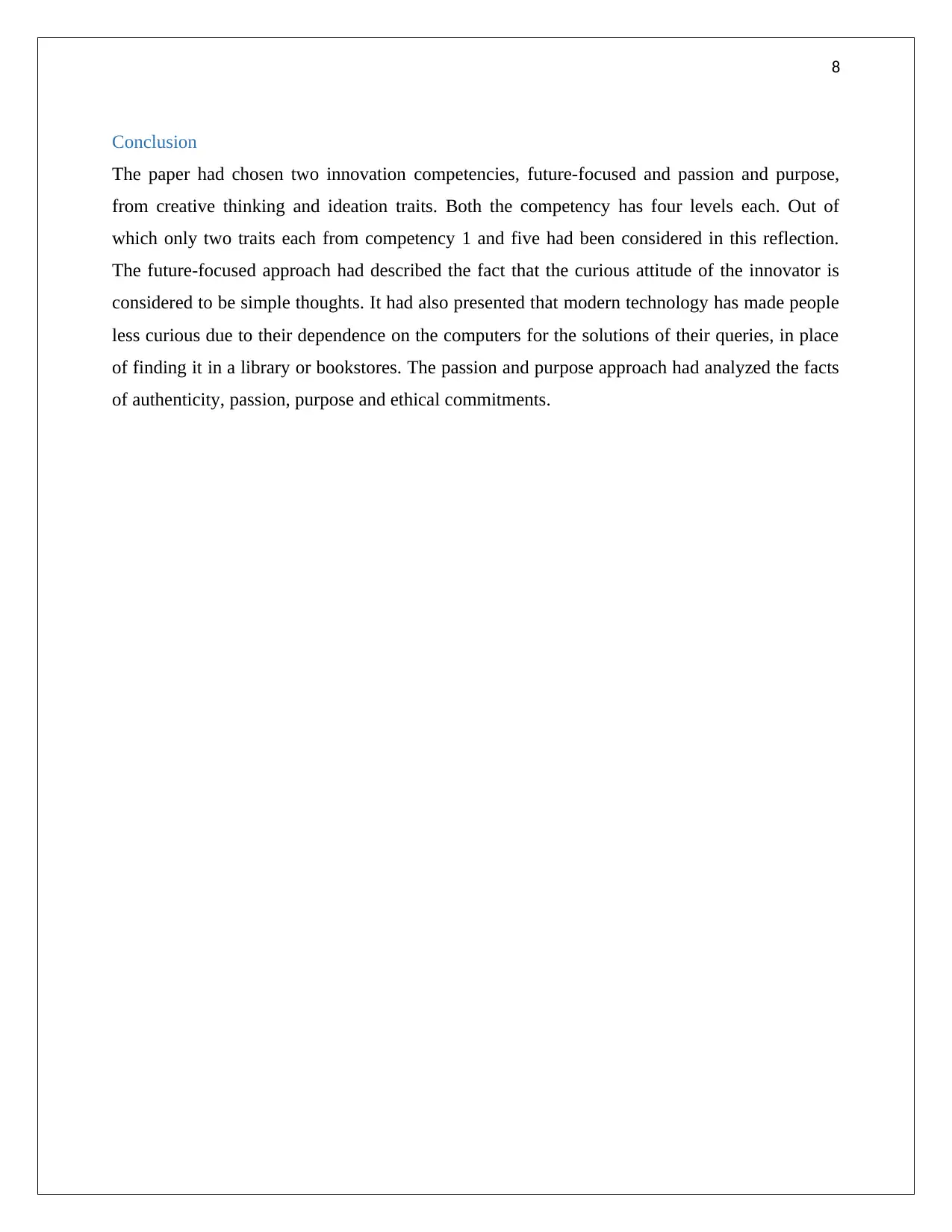
8
Conclusion
The paper had chosen two innovation competencies, future-focused and passion and purpose,
from creative thinking and ideation traits. Both the competency has four levels each. Out of
which only two traits each from competency 1 and five had been considered in this reflection.
The future-focused approach had described the fact that the curious attitude of the innovator is
considered to be simple thoughts. It had also presented that modern technology has made people
less curious due to their dependence on the computers for the solutions of their queries, in place
of finding it in a library or bookstores. The passion and purpose approach had analyzed the facts
of authenticity, passion, purpose and ethical commitments.
Conclusion
The paper had chosen two innovation competencies, future-focused and passion and purpose,
from creative thinking and ideation traits. Both the competency has four levels each. Out of
which only two traits each from competency 1 and five had been considered in this reflection.
The future-focused approach had described the fact that the curious attitude of the innovator is
considered to be simple thoughts. It had also presented that modern technology has made people
less curious due to their dependence on the computers for the solutions of their queries, in place
of finding it in a library or bookstores. The passion and purpose approach had analyzed the facts
of authenticity, passion, purpose and ethical commitments.
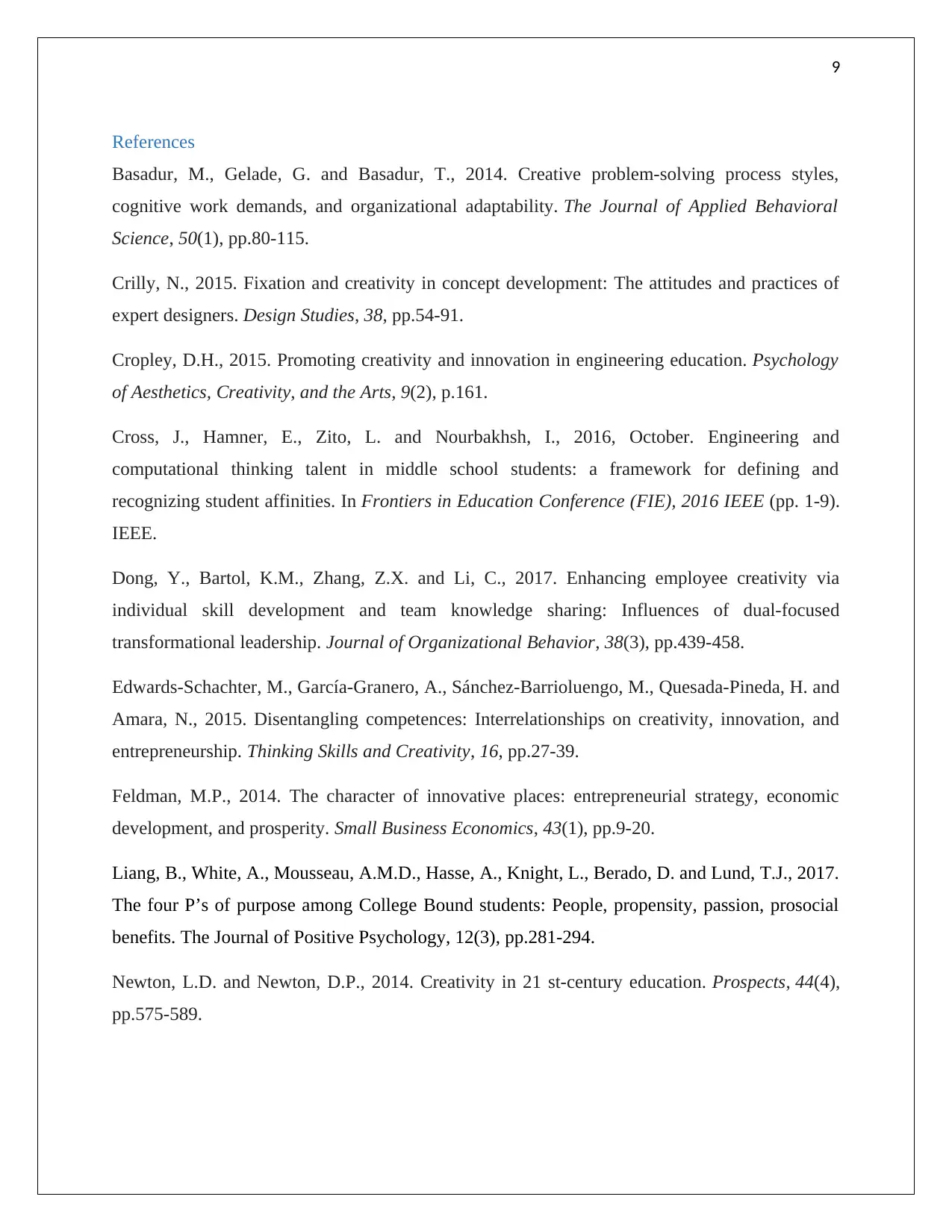
9
References
Basadur, M., Gelade, G. and Basadur, T., 2014. Creative problem-solving process styles,
cognitive work demands, and organizational adaptability. The Journal of Applied Behavioral
Science, 50(1), pp.80-115.
Crilly, N., 2015. Fixation and creativity in concept development: The attitudes and practices of
expert designers. Design Studies, 38, pp.54-91.
Cropley, D.H., 2015. Promoting creativity and innovation in engineering education. Psychology
of Aesthetics, Creativity, and the Arts, 9(2), p.161.
Cross, J., Hamner, E., Zito, L. and Nourbakhsh, I., 2016, October. Engineering and
computational thinking talent in middle school students: a framework for defining and
recognizing student affinities. In Frontiers in Education Conference (FIE), 2016 IEEE (pp. 1-9).
IEEE.
Dong, Y., Bartol, K.M., Zhang, Z.X. and Li, C., 2017. Enhancing employee creativity via
individual skill development and team knowledge sharing: Influences of dual‐focused
transformational leadership. Journal of Organizational Behavior, 38(3), pp.439-458.
Edwards-Schachter, M., García-Granero, A., Sánchez-Barrioluengo, M., Quesada-Pineda, H. and
Amara, N., 2015. Disentangling competences: Interrelationships on creativity, innovation, and
entrepreneurship. Thinking Skills and Creativity, 16, pp.27-39.
Feldman, M.P., 2014. The character of innovative places: entrepreneurial strategy, economic
development, and prosperity. Small Business Economics, 43(1), pp.9-20.
Liang, B., White, A., Mousseau, A.M.D., Hasse, A., Knight, L., Berado, D. and Lund, T.J., 2017.
The four P’s of purpose among College Bound students: People, propensity, passion, prosocial
benefits. The Journal of Positive Psychology, 12(3), pp.281-294.
Newton, L.D. and Newton, D.P., 2014. Creativity in 21 st-century education. Prospects, 44(4),
pp.575-589.
References
Basadur, M., Gelade, G. and Basadur, T., 2014. Creative problem-solving process styles,
cognitive work demands, and organizational adaptability. The Journal of Applied Behavioral
Science, 50(1), pp.80-115.
Crilly, N., 2015. Fixation and creativity in concept development: The attitudes and practices of
expert designers. Design Studies, 38, pp.54-91.
Cropley, D.H., 2015. Promoting creativity and innovation in engineering education. Psychology
of Aesthetics, Creativity, and the Arts, 9(2), p.161.
Cross, J., Hamner, E., Zito, L. and Nourbakhsh, I., 2016, October. Engineering and
computational thinking talent in middle school students: a framework for defining and
recognizing student affinities. In Frontiers in Education Conference (FIE), 2016 IEEE (pp. 1-9).
IEEE.
Dong, Y., Bartol, K.M., Zhang, Z.X. and Li, C., 2017. Enhancing employee creativity via
individual skill development and team knowledge sharing: Influences of dual‐focused
transformational leadership. Journal of Organizational Behavior, 38(3), pp.439-458.
Edwards-Schachter, M., García-Granero, A., Sánchez-Barrioluengo, M., Quesada-Pineda, H. and
Amara, N., 2015. Disentangling competences: Interrelationships on creativity, innovation, and
entrepreneurship. Thinking Skills and Creativity, 16, pp.27-39.
Feldman, M.P., 2014. The character of innovative places: entrepreneurial strategy, economic
development, and prosperity. Small Business Economics, 43(1), pp.9-20.
Liang, B., White, A., Mousseau, A.M.D., Hasse, A., Knight, L., Berado, D. and Lund, T.J., 2017.
The four P’s of purpose among College Bound students: People, propensity, passion, prosocial
benefits. The Journal of Positive Psychology, 12(3), pp.281-294.
Newton, L.D. and Newton, D.P., 2014. Creativity in 21 st-century education. Prospects, 44(4),
pp.575-589.
Secure Best Marks with AI Grader
Need help grading? Try our AI Grader for instant feedback on your assignments.
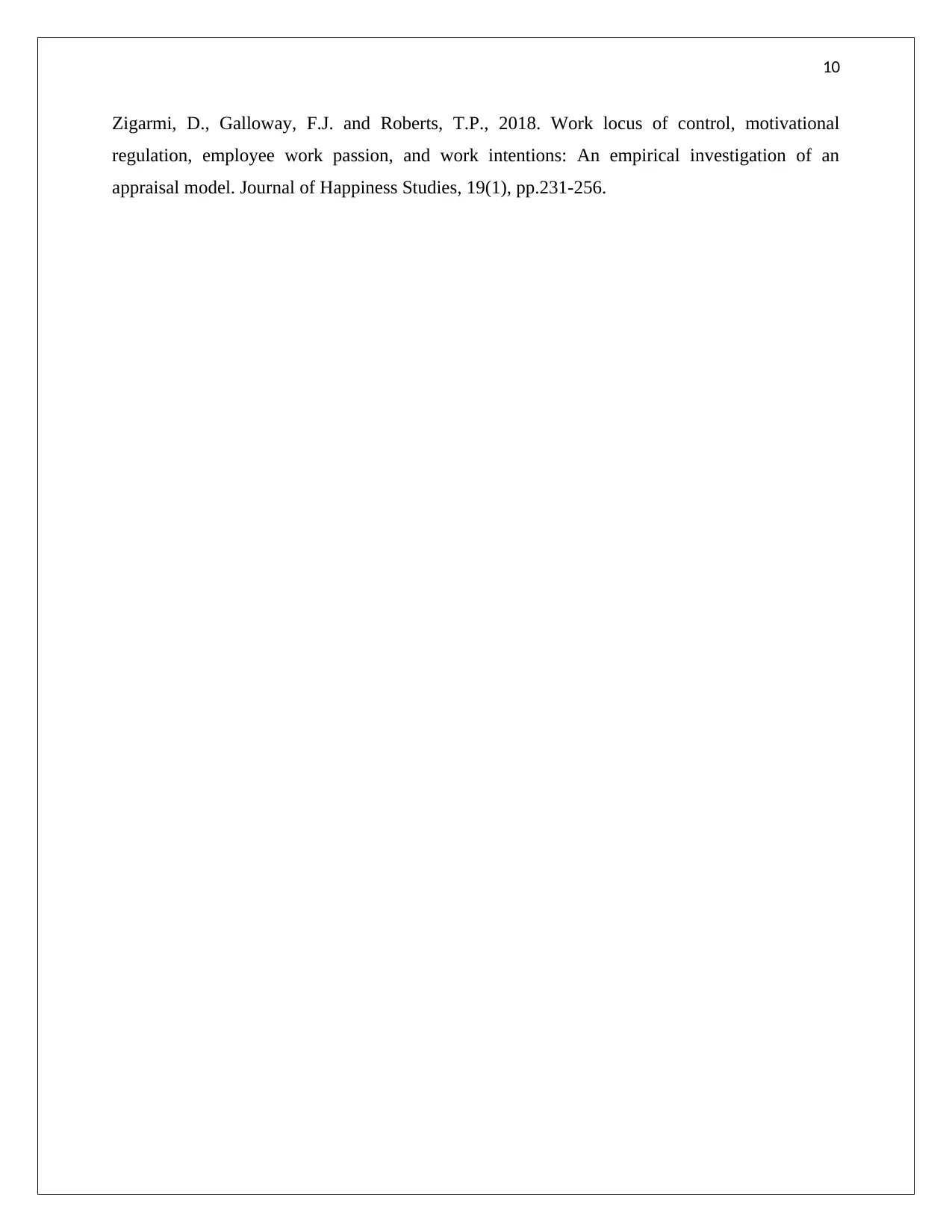
10
Zigarmi, D., Galloway, F.J. and Roberts, T.P., 2018. Work locus of control, motivational
regulation, employee work passion, and work intentions: An empirical investigation of an
appraisal model. Journal of Happiness Studies, 19(1), pp.231-256.
Zigarmi, D., Galloway, F.J. and Roberts, T.P., 2018. Work locus of control, motivational
regulation, employee work passion, and work intentions: An empirical investigation of an
appraisal model. Journal of Happiness Studies, 19(1), pp.231-256.
1 out of 11
Related Documents
Your All-in-One AI-Powered Toolkit for Academic Success.
+13062052269
info@desklib.com
Available 24*7 on WhatsApp / Email
![[object Object]](/_next/static/media/star-bottom.7253800d.svg)
Unlock your academic potential
© 2024 | Zucol Services PVT LTD | All rights reserved.
